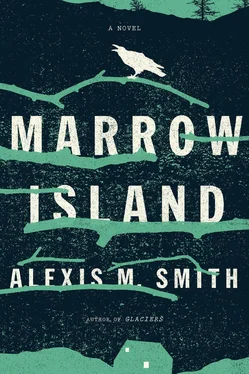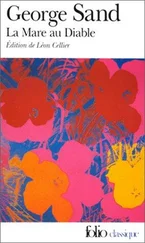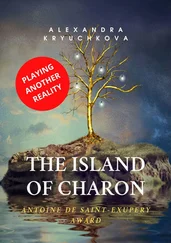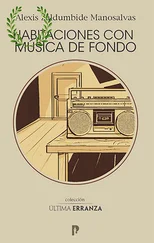I asked if that meant the fire lookout would be staffed this year, and Carey said, “Yeah, maybe.” Which means I’ll have to find another place. My first choice is the lake, since there’s a one-room cabin there. Carey said Eagle Scouts built it in the nineties; it’s a miracle it’s still standing. I’ve seen it once, from a distance. It looked more like the setting for a horror movie than a place to relax, but I’m going to investigate. Get my scent in the air so the animals there start to know me. If they know me, if they recognize my scent, will they be less likely to want to eat me? Or more?
I spend a lot of time up here thinking of all the different ways people die in the wilderness. There’s the obvious: hypothermia, dehydration, hunger. Or the fatal mistake: eating strange plants, drinking giardia-laced water. There’s the unlikely, but imminently possible: drowning; bear; snakebite. There’s bad luck: rockslide; falling tree; lightning strike; drunk hunter. There’s the long exit: tick bite, Lyme disease.
Or when I’m hiking a steep trail and my foot slips in the loose rocks and I catch myself — just barely — on a root or a tree branch, stumble back onto the path. I look down and see a very real vision of my broken body and the headline flashing across the news feeds of everyone I know, the shares on social media: “Body of Seattle Woman Recovered in Malheur Forest.” At some point I made a choice to be there, snagged on that shelf of earth and not down at the bottom in a heap. Not just one choice, many choices. Thousands — how far back in my life? days, weeks, years? — they flow back instantly, it’s not even conscious; all the choices jolt through the body and some cellular consciousness, some small muscle in my foot that senses the imminent danger, sends up a flare to my brain. So that I reach out at the right moment, leaning just so, throwing my weight back onto the trail. My thoughts stream back. I remember the moment I chose that particular trail, chose to come out alone, at that time of day, under those dry conditions, in those inadequate shoes, not the proper boots, because they would be too hot. Did I drink enough water? Eat enough breakfast? I rested, on that rock in the shade just a mile back, though I wasn’t especially tired — did some part of me know? And farther back — the choice to leave Seattle and follow Carey to the woods at all, the choice to go to the islands, where we met, where I could have died. It flashes through my body, with the adrenaline in my bloodstream, the certain knowledge of how tenuous it all is, the web of everything I’ve done — all leading to this moment: staring down at that parallel life, the one where I/she lies unable to move, in the bottom of that ravine, covered in dust and rocks and the ash of old fires, until I/she dies. Which choice was it? Which one saved me? Which one killed her?
And I then wipe my brow and hike on.
Halfway to the lake, mosquitoes strum the air. The sun angles through the trees and I’m aware of my sweat, along with the chemical perfume of my exhalations that the female mosquitos recognize from yards away. So much for this dry heat; where the air is thinner, you work harder for each breath, and I’ve been exerting myself. I might as well have a neon sign over my head that says BREAKFAST. The mosquitoes have been exerting themselves, too. They’ve been fucking and now they’re hungry. They need energy to lay the thousands of eggs they will deposit in the first still pool of water they find. Through the pines to the lake, they feed on me like children. I don’t catch them till they’re flying away, full of my blood. Male mosquitoes, the dandies, survive on wildflower nectar.
I smell the water before I see it. Water lifts all the smells around. The mist rises; the vapors carry particles of resin and pollen and fungi spores. As I climb the last fallen tree and the lake comes into view, I connect a low murmur to the sound of it: not waves lapping, but the deeper, subtler sound of movement beneath the surface. I close my eyes and inhale, trying to feel the course of the vapors through my body, the whole invisible forest in my sinuses, my lungs, my blood. Everything right down to my cells and further: to the mitochondria, the tiniest lungs, where respiration continues after the death of the brain, the heart. The last breaths of the cells happen there, as the body decays, releasing all that stored energy at last. Hot sacks of cells, our bodies, like compost heaps, steaming with everything we take in, unsure of how to let go.
When I open my eyes, I focus on the ground near my feet. A shrug of fallen needles and leaves that seems to be levitating, and I know that underneath I will find the fruits of the mycelium. I carefully lift a corner of the leaf cover with a stick to reveal the pale young bodies of the mushrooms. I squat to get closer, and a smell like maple syrup wafts up out of the duff. I pluck a specimen from the rim of the colony. A fat, opalescent beetle scuttles into the vacancy in the soil. I hold the specimen in my palm and gently examine it. It looks deceptively delicate, almost feminine, something out of a fairy tale: thin white stem, slick, round, lilac cap; but it is firm and unresisting to the touch. I look at it lying in my palm and think of Sister J., shroud-pale, plucked from her island, cell walls breaking. Sometimes I hear Katie’s voice in my head, answering questions I haven’t really asked. I hear her now, telling me to put my hands in the soil, like I did on Marrow, to feel the threaded white mass netting my fingers.
“Mycelium takes everything we give it,” she says, “and transforms death into life. It communicates directly with the soul of every living thing that touches it.”
“But I probably shouldn’t eat it,” I say, to Katie or whatever’s listening.
You’re supposed to talk or sing when you’re alone in the wilderness, to alert the wildlife that you’re there, that you’re coming, to startle them away. I usually sing. A woman in Colorado fended off a cougar by singing opera to it. When I’m not singing, I talk to Katie. At first it was awkward — I was afraid I’d encounter another hiker who would overhear my half of the conversation and think I was crazy — but now I’m so used to it that I find myself talking to her in the cabin or at the lookout.
The birdsong continues all around as if I’m not there; Katie’s gone quiet. I want to eat the mushroom. I test it with my teeth. I take a small bite out of the cap. It’s slippery on the outside but almost powdery dry inside. I hold it in my mouth long enough to know it is vegetal, almost spicy but not unpleasant, then spit it out. I pick another and place them in a small paper bag. Tuck it into the top of my pack, so it won’t be crushed. There’s a book back at the cabin for taxonomic classification.
The scout cabin is another mile around the west side of the lake. I take a small, almost-disused path and have to scrape my way through a curtain of branches to find it, a half-fallen tree barring the way. The door is off the hinges and leaning horizontally across the threshold. I use a large forked stick with clusters of lichen to remove the spiderwebs from the door frame. Not taking any more chances with arachnids today. When the doorway is clear, I poke my head inside. It’s dark, with only one window (broken out), and it smells distinctly like piss. There’s a shiver in a dark corner, and I’m certain there’s a nest of snakes there, so I step back outside and walk along the trail until I find a path down to a small stretch of silt and rock shoreline.
It won’t do for a retreat. At the fire lookout, I float above the trees. That’s where I’m most at ease — in midair, like a cloud.
I plant myself on a dry boulder and grab a can of beer from my backpack. As I open the can with a pop-crack, I wonder what kind of meal I sound like to the lynx. The cheap lager foams all over my hand. My mouth and throat are parched, so I drink half of it in one slug. It buzzes through me. The cereal and peanut butter balls go down fast, and the rest of the can after. Then I’m stripping off my boots and socks, without a second thought, opening another beer, and wading into the water. It’s so cold I gasp, but force myself to breathe through it. The days have been warm this spring, but at this elevation the nights can still fall close to freezing. In the winter, the lake was frozen over, and it hasn’t been that long since it thawed. It’s ice-clear; I see all the pebbles in the bottom, stretched several feet in front of me, where the bottom dips into a darker blue. There are layers of color, in the lake, just like in the sea, when the water is still. The water is denser where it’s coldest near the bottom, so the colors become murky and shaded, and the fish and rocks down there distorted.
Читать дальше












